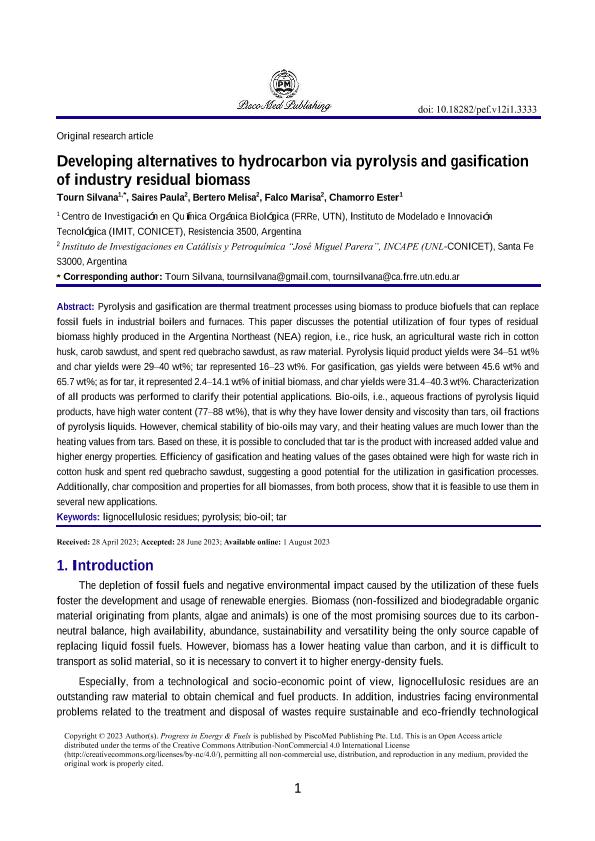Artículo
Developing alternatives to hydrocarbon via pyrolysis and gasification of industry residual biomass
Tourn, Silvana Cecilia ; Saires, Paula Judith
; Saires, Paula Judith ; Bertero, Melisa Paola
; Bertero, Melisa Paola ; Falco, Marisa Guadalupe
; Falco, Marisa Guadalupe ; Chamorro, Ester Ramona
; Chamorro, Ester Ramona
 ; Saires, Paula Judith
; Saires, Paula Judith ; Bertero, Melisa Paola
; Bertero, Melisa Paola ; Falco, Marisa Guadalupe
; Falco, Marisa Guadalupe ; Chamorro, Ester Ramona
; Chamorro, Ester Ramona
Fecha de publicación:
08/2023
Editorial:
PsicoMed Publishing
Revista:
Progress in Energy & Fuels
ISSN:
2315-4640
Idioma:
Inglés
Tipo de recurso:
Artículo publicado
Clasificación temática:
Resumen
Pyrolysis and gasification are thermal treatment processes using biomass to produce biofuels that can replace fossil fuels in industrial boilers and furnaces. This paper discusses the potential utilization of four types of residual biomass highly produced in the Argentina Northeast (NEA) region, i.e., rice husk, an agricultural waste rich in cotton husk, carob sawdust, and spent red quebracho sawdust, as raw material. Pyrolysis liquid product yields were 34–51 wt% and char yields were 29–40 wt%; tar represented 16–23 wt%. For gasification, gas yields were between 45.6 wt% and 65.7 wt%; as for tar, it represented 2.4–14.1 wt% of initial biomass, and char yields were 31.4–40.3 wt%. Characterization of all products was performed to clarify their potential applications. Bio-oils, i.e., aqueous fractions of pyrolysis liquid products, have high water content (77–88 wt%), that is why they have lower density and viscosity than tars, oil fractions of pyrolysis liquids. However, chemical stability of bio-oils may vary, and their heating values are much lower than the heating values from tars. Based on these, it is possible to concluded that tar is the product with increased added value and higher energy properties. Efficiency of gasification and heating values of the gases obtained were high for waste rich in cotton husk and spent red quebracho sawdust, suggesting a good potential for the utilization in gasification processes. Additionally, char composition and properties for all biomasses, from both process, show that it is feasible to use them in several new applications.
Palabras clave:
LIGNOCELLULOSIC RESIDUES
,
PYROLYSIS
,
BIO-OIL
,
TAR
Archivos asociados
Licencia
Identificadores
Colecciones
Articulos(INCAPE)
Articulos de INST.DE INVEST.EN CATALISIS Y PETROQUIMICA "ING. JOSE MIGUEL PARERA"
Articulos de INST.DE INVEST.EN CATALISIS Y PETROQUIMICA "ING. JOSE MIGUEL PARERA"
Citación
Tourn, Silvana Cecilia; Saires, Paula Judith; Bertero, Melisa Paola; Falco, Marisa Guadalupe; Chamorro, Ester Ramona; Developing alternatives to hydrocarbon via pyrolysis and gasification of industry residual biomass; PsicoMed Publishing; Progress in Energy & Fuels; 12; 1; 8-2023; 1-23
Compartir
Altmétricas



